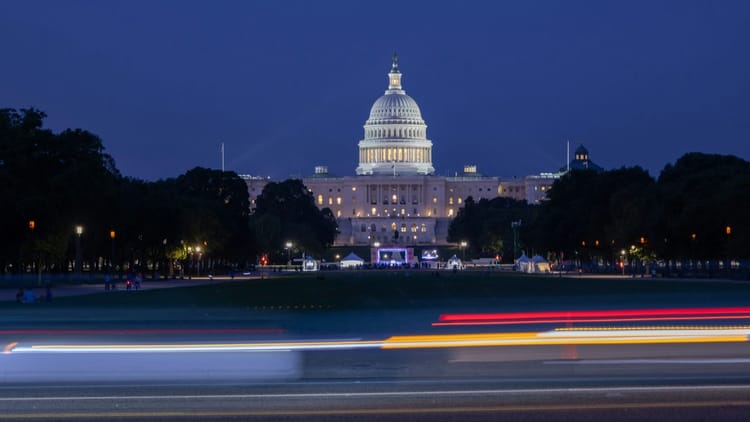Checks and balances

Recently: Why are so many people in so many countries around the world drinking less? Tim Naimi on the spread of sobering research about alcohol’s adverse health effects, the tightening of economic pressures, and the myth of the moderate European drinker.
Today: U.S. presidential power meets legal limits as Trump’s tariff authority hits a wall in the courts. America’s health secretary faces Republican resistance despite Trump’s backing. In South Asia, cross-border flooding shows water control becoming a major power lever. Harvard University escapes a federal funding freeze over campus politics. & Fashion loses its master of quiet influence.
+ Why is Russia screwing around with GPS navigation on flights across Europe? Darrell Driver on the psychological campaign to change European hearts and minds about Ukraine.
& New music from Adrian Sherwood ...
A new legal test of American presidential power
President Donald Trump asked the U.S. Supreme Court on Wednesday for an expedited review of a ruling by a federal appeals court that found most of his tariffs illegal—arguing that the “financial fabric of our country” is at stake, and striking down the tariffs could force the federal government to refund billions in tariff payments already collected from importers.
The 7-4 decision determined that only Congress has constitutional authority to impose such sweeping trade taxes, ruling that Trump exceeded his authority in using emergency powers to justify what amounts to broad taxation affecting nearly 70 percent of U.S. imports.
The tariff battle as a whole exemplifies one of the most striking patterns of the second Trump administration: its systematic testing of presidential power limits—from deploying troops in American cities to using military force against Venezuelan drug cartels—to push executive authority into domains traditionally reserved for Congress or civilian agencies.
U.S. Republicans turn on their man
America’s Health Secretary Robert F. Kennedy Jr. faced strikingly hostile questioning—from both Democratic and Republican senators—during a U.S. Senate Finance Committee hearing over his firing of Centers for Disease Control and Prevention Director Susan Monarez and his implementation of sweeping changes to federal vaccine policy.
Kennedy defended firing Monarez after she refused to support his vaccine-policy reversals, while Senator Bill Cassidy—a Republican physician whose support was crucial for Kennedy’s confirmation earlier this year—expressed concern about his and the administration’s handling of vaccines. Even Republicans who confirmed Kennedy are now questioning his overhaul of health policy—and approach reflected in Florida’s just-announced elimination of vaccine mandates that have been standard practice for decades.
Also notable: The committee’s Republican chairman Mike Crapo refused Democrats’ request to swear Kennedy in under oath.
Water as political power
Nearly half a million people were evacuated from Pakistan’s Punjab province since Wednesday, as flooding worsened, bringing the total displaced to 1.8 million in what officials call “the worst flooding in Punjab’s history.”
Pakistani authorities say the crisis was triggered by India’s release of water from overflowing dams into low-lying border regions, with three rivers bursting their banks after India sent its third flood alert this week through diplomatic channels.
The disaster shows how countries controlling dams and rivers can essentially export their flooding problems to downstream neighbors, raising questions about the extent to which water risks becoming a major new source of regional tension as climate change advances.

Back to researching then at Harvard
A U.S. federal judge ruled that the Trump administration illegally froze US$2.2 billion in Harvard University research funding, determining that the government “used antisemitism as a smokescreen for a targeted, ideologically-motivated assault on this country’s premier universities.”
Judge Allison Burroughs noted that only one of the administration’s 10 demands to Harvard actually related to antisemitism, while others required restructuring governance, hiring practices, and campus programs to match the administration’s political preferences.
The ruling protects Harvard’s $2.2 billion in research funding, but it’s still up in the air as to whether the administration’s appeal might establish precedent for conditioning federal grants on university governance changes.
Armani’s empire of understatement
The Italian designer Giorgio Armani has died at the age of 91, after a half-century career that redefined “power dressing” through minimalist elegance over ostentatious display.
Armani revolutionized both men’s and women’s fashion with soft tailoring and unstructured silhouettes that highlighted the idea of the human body as an object of art, while building a US$10+ billion empire from fashion into films, hotels, and even ownership of Italy’s premier basketball team.
In his final interview (with the Financial Times, in August), Armani said, “My initial goal was to dress people but from there I moved naturally into other areas, because I wanted to offer those entering the Armani world a unique experience. I have in fact created a lifestyle that I would define as a world of natural sophistication, in which nothing is over the top but everything finds a balance that, while whispered, is rich in personality.”

Wary of fast fashion?
Shop Congo Clothing Company and
make a difference—in style.
Jamming
On Monday, European Commission President Ursula von der Leyen was flying from Poland to Bulgaria, as part of a tour of four Eastern European countries. Weirdly, her plane’s GPS navigation stopped working as it was approaching the airport in Plovdiv, Bulgaria’s second-largest city. The pilots had to use paper maps to land.
Soon after, the Commission claimed that Russia intentionally jammed the plane’s GPS. It wouldn’t be the first time Moscow had disrupted the navigation systems of flights around Europe. In recent years, it’s used both jamming (when a strong transmitter overrides a global positioning system’s relatively faint signals) and spoofing (when more powerful transmitters send false information to a plane’s nav system) to mess with tens of thousands of flights around its borders.
Russia has also apparently interfered with the flights of other top European officials, including two trips by Carsten Breuer, the head of Germany’s armed forces, and Grant Schapps, while he was the U.K.’s defense minister last year. The commercial carrier Finnair stopped flying to the city of Tartu in Estonia in 2024, after two of its flights had to turn around because of GPS jamming. Military analysts say Moscow regularly jams the GPS of NATO flights near the Russian enclave of Kaliningrad, between Poland and Lithuania.
Why are they doing this?
In February, we spoke with Darrell Driver about the Kremlin’s broader campaign of sabotage across the Continent. Last winter, Sweden and Norway seized Russian ships and accused them of cutting undersea power and data cables in the North Sea and the Baltic Sea. Before that, European authorities said Moscow had broken into water-treatment plants, orchestrated plans to blow up cargo planes, and even plotted the assassination of the CEO of Germany’s largest arms manufacturer, Rheinmetall.
Darrell says the sabotage is all about Ukraine: Moscow is undertaking these operations because it wants to get European leaders—and the European public—to rethink their support for Kyiv, by getting them to see that support as carrying serious risks. And even once the war ends, the sabotage might not stop: If the EU and the U.S. try to integrate Ukraine into Western institutions, the Kremlin might keep trying to make Europeans feel the costs of doing that will be too high …
Your loyal guide to a changing world.
Membership with The Signal means exclusive access to premium benefits:
- Regular profiles on the questions behind the headlines
- In-depth feature interviews with our network of specialist contributors from across America and around the world
- The despatch, our weekly current-affairs and cultural-intelligence briefing
- Early access to new products, including print extras
It also means vital support for an independent new enterprise in current-affairs journalism.
‘The Collapse of Everything’






